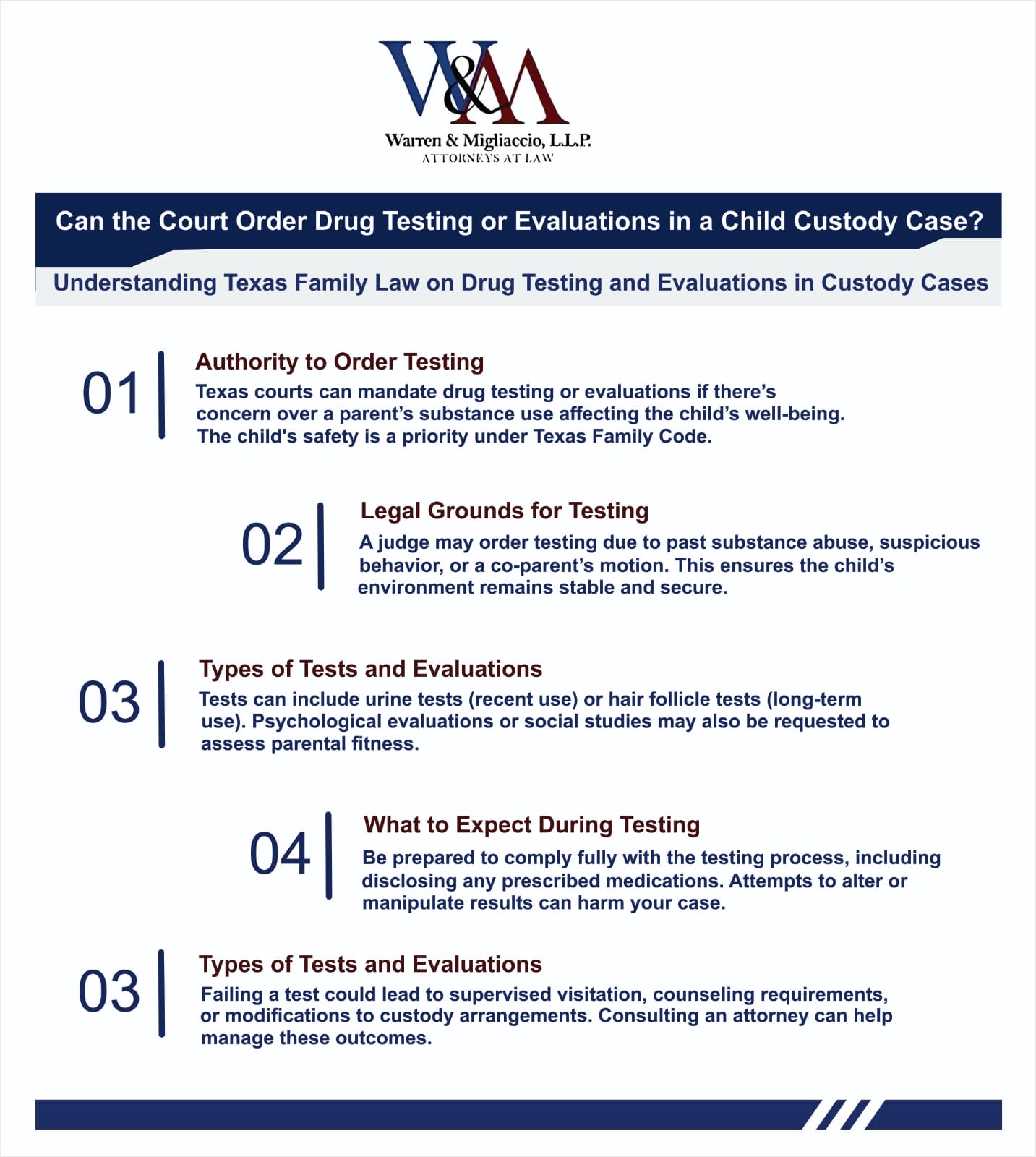Can the court order drug testing or evaluations in a child custody case? In Texas, the answer is a resounding yes. Facing a Texas child custody case involving drug testing or evaluations can be daunting. Understanding the process and your parental rights within the Texas Family Code is crucial. This article explains the relevant Texas laws and what you can expect.
Can the Court Order Drug Testing or Evaluations in a Child Custody Case in Texas?
Facing a child custody case in Texas often involves questions related to drug testing and evaluations. Parents wonder if the court holds such authority. The simple answer is yes, a court can order drug testing or evaluations in a child custody case.
The child’s well-being is paramount in Texas family law cases. If substance abuse is a concern, the court may order tests or evaluations to protect the child. This addresses parental concerns about court-ordered testing in custody disputes.

Types of Tests and Evaluations
Courts can use various testing methods, from urine tests to hair follicle testing. Drug test procedures can be done through an attorney, CPS or as otherwise requested. Beyond drug tests, psychological evaluations or social studies may be ordered to assess a parent’s mental health.
These evaluations offer insight into parental fitness and decision-making abilities. If you are involved in a custody dispute with substance abuse issues, consult a custody lawyer.
What to Expect During Drug Testing and Evaluations
Preparation is key when facing drug testing or psychological evaluations in custody proceedings. Be ready to comply with any court ordered drug testing. Consult with an experienced family law attorney and custody attorney regarding the laws in child custody cases related to substance abuse.
For drug tests:
- Cooperate fully and be honest. Attempts to manipulate results can negatively affect your case and temporary orders.
- Disclose any prescribed medications to the testing facility and the court.
- Talk to your custody attorney about the consequences of failing the test and the possible next steps. This may involve changes to your current possession order or requirements for drug or alcohol counseling.
- Urine specimens are checked for dilution or adulterants. Clipping nails or shaving hair suggests tampering, potentially impacting custody rights.
For Evaluations:
- These evaluations may include interviews with you, your child, or teachers to get a full picture of your family situation.
- Prepare to take standardized psychological or behavioral tests if required.
- The type of drug test ordered—such as urine, hair follicle, or nail—depends on the suspected drug use type and frequency.
- Most cases begin with a urine test to detect recent drug or alcohol use. If more details are needed, nail or hair follicle tests may follow.
- Testing costs vary. Urine tests are usually cheaper than nail or hair follicle tests. Your child custody attorney can guide you through the legal process, costs, and the right testing approach.
The Impact of Test Results on Child Custody
Failing a court-ordered drug test in child custody cases can have serious consequences, such as:
- An emergency hearing request.
- The issuance of a restraining order
- A shift to supervised visitation, limiting time alone with the child.
- Required attendance at drug/alcohol treatment or counseling
Challenging Drug Test Results
Parents can challenge inaccurate positive test results, which can affect child custody outcomes. For instance, testing positive for marijuana due to passive exposure at a concert can be disputed.
Other inaccuracies can arise, such as inconsistencies between urine and hair follicle drug test results. This could even invalidate the results. Some people try to mask drug use with special shampoos or by excessive water intake, but testing agencies look for these tactics.
Marijuana and Child Custody in Texas
A positive marijuana test alone won’t necessarily lead to Child Protective Services (CPS) involvement. Under Texas Family Code § 262.116(a)(7), CPS intervenes only if the marijuana use endangers the child. Consult a child custody attorney, family law firm, experienced divorce lawyer and/or law faq to learn more about challenging drug test results. These are good business interests for child protective services. It might mean a collaborative divorce process could avoid this all.

Protecting Your Rights During Drug Testing or Evaluations
Facing a drug test or evaluation request in a child custody case can be daunting. Seeking guidance from an experienced Texas family law attorney is essential. They can explain the testing process, protect your rights, and advocate for your best interests.
Even if recreational marijuana use seems insignificant, it could still negatively impact your case. Consulting with an attorney early on helps navigate the complexities of family law and protect your parental rights.
Standard Possession Order in Texas
Texas Family Code 153.252 establishes the presumption of a standard possession order for children three and older. This designates one parent as the custodial parent (receiving child support) but does not determine sole custody. The specific arrangements depend on the distance between the parents’ residences.
| If parents live within 100 miles of each other | If parents live over 100 miles away from each other |
|---|---|
| The non-custodial parent has possession of the child on the 1st, 3rd, and 5th weekends of each month. | Similar to the 100-mile order, or reduced to once a month. |
| Possession on Thursdays during the school year. | Alternative holiday schedule. |
| Possession varies annually for holidays. | 42 summer days (including Spring Break), increased from 30 days. |
In cases with drug concerns, custody arrangements are determined on a case-by-case basis to ensure the child’s best interest is maintained. Supervised visits may be ordered to ensure the child’s safety. This addresses concerns about ongoing drug use during visits, prioritizing the child’s safety in these circumstances.
FAQs about Can the court order drug testing or evaluations in a child custody case
What methods of evaluation are used in Texas child custody cases?
Courts may order various evaluations such as urine, hair, or blood tests for drug use, psychological evaluations, and home studies. This ensures that potential risks can be discovered before final rulings of child custody and visitation.
Type of drug test is used in Texas custody cases?
Urine tests commonly detect recent drug use. Hair follicle tests reveal patterns of drug use over time. Blood tests can offer comprehensive information and find a more in-depth picture of the truth for the child custody lawyer to work with. Sometimes, combining all tests for accuracy could reveal important answers related to an attorney’s custody case strategy.
Can a positive drug test result in losing custody of my child in Texas?
Not necessarily. While a positive drug test can impact custody decisions, it does not mean you will lose custody. Courts consider various factors, including the severity of substance use, its impact on the child, and steps taken toward treatment. Seeking legal guidance can help navigate these situations.
What should I do if I’m ordered to undergo a drug test in a child custody case?
Complying with the court order is essential. Be honest and disclose any prescribed medications beforehand. Attempting to manipulate test results could harm your case. It’s advisable to consult an experienced custody attorney who can guide you the best approach.
Who Pays for the Tests?
Typically, the requesting parent initially pays. If the results are positive, the court can order the tested parent to reimburse the other party. This is part of the overall allocation of expenses in the family law case.
What Happens If You Fail a Drug Test?
Failing a drug test doesn’t mean losing custody. It impacts the judge’s decision in your family law case, influencing parental rights and possession orders. The severity depends on factors like the substance, frequency of use, and parental fitness.
The court might order supervised visitation or need participation in a treatment program. The judge might also order corrective actions like parenting classes or counseling.

Conclusion
Yes, Texas courts can order drug testing or evaluations in a child custody case. This process can feel overwhelming, but knowing your rights and understanding each step can help ease concerns.
A positive drug test doesn’t necessarily mean you’ll lose custody of your children, though it may impact custody decisions. Seeking appropriate treatment, such as those for bipolar disorder or ADHD, can demonstrate responsibility and commitment to improvement.
In these cases, having experienced legal support is crucial. The child custody process can be complex, and consulting a professional is essential. Remember, this post is not a substitute for legal advice. Our estate planning attorneys at Warren & Migliaccio are here to discuss your unique situation, answer your questions, and guide you through each step. Call us at (888) 584-9614 or contact us online to get the support you need today.

